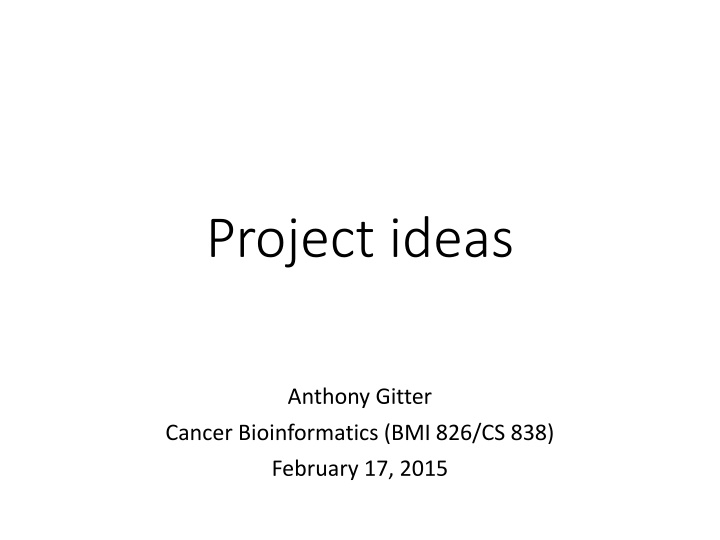
Innovative Cancer Bioinformatics Project Ideas for Students
Explore exciting cancer bioinformatics project ideas for students to work on, utilizing high-throughput cancer data, extending existing methods, and participating in DREAM challenges. Propose novel hypotheses, ensure computational reproducibility, and aim for impactful cancer research outcomes.
Download Presentation

Please find below an Image/Link to download the presentation.
The content on the website is provided AS IS for your information and personal use only. It may not be sold, licensed, or shared on other websites without obtaining consent from the author. If you encounter any issues during the download, it is possible that the publisher has removed the file from their server.
You are allowed to download the files provided on this website for personal or commercial use, subject to the condition that they are used lawfully. All files are the property of their respective owners.
The content on the website is provided AS IS for your information and personal use only. It may not be sold, licensed, or shared on other websites without obtaining consent from the author.
E N D
Presentation Transcript
Project ideas Anthony Gitter Cancer Bioinformatics (BMI 826/CS 838) February 17, 2015
Overview Groups of 2-3 students Survey forthcoming Projects will Use high-throughput cancer data (genomic, gene expression, proteomic, methylation, etc.) Extend an existing method or implement a new model Produce and evaluate novel hypotheses Be computationally reproducible Propose your own topic or select from these ideas Proposals due 3/10
Extending existing methods Choose a method that has source code available GISTIC 2.0 Mutational signatures MEMo Dendrix Make sure the code isn t a mess and the data are available before you submit the project proposal Look ahead to papers we will read that provide code Helios Setty2012 or RACER Osmanbeyoglu2014 HotNet2 NBS (bad link?) Can improve the algorithm or integrate more data
DREAM Challenges Dialogue for Reverse Engineering Assessments and Methods Broad-DREAM Gene Essentiality Prediction Challenge DREAM 7 - Sage Bionetworks-DREAM Breast Cancer Prognosis Challenge DREAM 7 - NCI-DREAM Drug Sensitivity Prediction Challenge Don t reproduce methods that have already been shown to work well
Broad-DREAM Gene Essentiality Prediction Challenge https://www.synapse.org/#!Synapse:syn2384331/ wiki/ Predict gene essentiality in cancer cell lines Whether the cancer cells grow or die when the gene is suppressed Available features Gene expression Copy number Mutations External data not included in the challenge
DREAM 7 - Sage Bionetworks-DREAM Breast Cancer Prognosis Challenge https://www.synapse.org/#!Synapse:syn2813426 http://www.the-dream- project.org/challenges/sage-bionetworks-dream- breast-cancer-prognosis-challenge Predict breast cancer survival Available features Clinical information Gene expression Copy number
DREAM 7 - NCI-DREAM Drug Sensitivity Prediction Challenge https://www.synapse.org/#!Synapse:syn2785778/ wiki/ Rank breast cancer cell lines by their sensitivity to drug compounds Available features Gene expression Copy number Mutations Methylation Proteomics
Drug sensitivity Instead of DREAM challenge, could use a larger dataset from CCLE or Garnett2012 datasets More cell lines and drugs Opportunity to train/test across datasets Explore low reproducibility in these screens
Suitable cell line models In the spirit of Domcke2013, identify cancer cell lines that are suitable models for tumor samples Integrate different types of data Focus on a systems-level analysis
Normalizing cancer gene expression Many studies that use gene expression for clustering or classification do not account for confounding effects Age, sex, and other covariates Expression due to tissue of origin Meta-PCNA example (next class) Normalizing expression data to remove these factors could improve cancer models Can integrate expression data from healthy cells or tissues TCGA normal samples GTEx GEO
